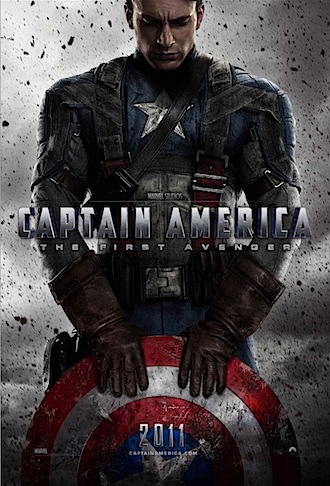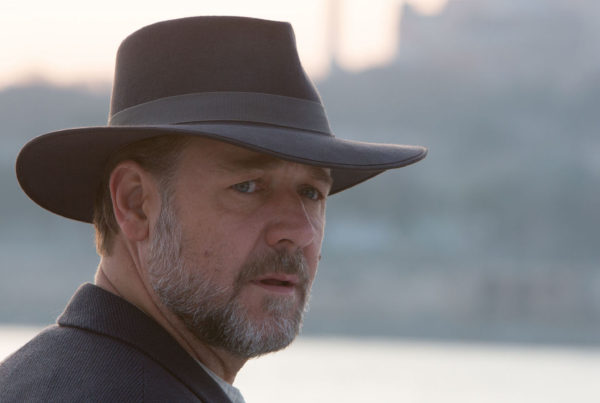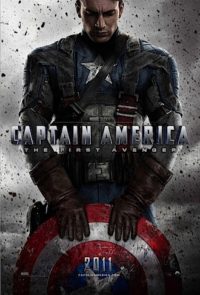 Of all the remakes, sequels, franchises and comic book adaptations we are being offered this winter Captain America: The First Avenger is the one least likely to send a shiver of excitement down a Kiwi filmgoer’s spine. And yet, from relatively modest beginnings a half decent adventure film grows – it isn’t going to change the way you think and feel about anything but Captain America at least won’t make you want to run screaming for the exits in embarrassment and shame.
Of all the remakes, sequels, franchises and comic book adaptations we are being offered this winter Captain America: The First Avenger is the one least likely to send a shiver of excitement down a Kiwi filmgoer’s spine. And yet, from relatively modest beginnings a half decent adventure film grows – it isn’t going to change the way you think and feel about anything but Captain America at least won’t make you want to run screaming for the exits in embarrassment and shame.
Steve Rogers (Chris Evans from Fantastic Four) is a weedy, sickly kid from Brooklyn – digitally de-hanced if that’s the opposite of enhanced – who desperately wants to fight the Nazis for Uncle Sam. After several humiliating rejections kindly scientist Stanley Tucci enlists him in an experimental super-soldier programme, fills him full of what looks like blue Powerade and turns him into a muscle-bound, fast-healing, über-grunt.
But the army (Tommy Lee Jones in good form) doesn’t know what do with him so he’s sent off to sell war bonds and stoke the home fires while a deranged Hugo Weaving hijacks the Nazi war effort for an even more dangerous world domination scheme. Eventually, through sheer bravery and gung-ho can-do, Cap forces the Army to see sense and he gets to take it to the fiendish Hun.
Not much more than a Saturday morning kids serial brought into the 21st century, Captain America disdains psychological complexity – or more than one layer of meaning – in favour of the kind of old-fashioned “beat up the Nazis” material that had audiences cheering sixty years ago. The real purpose of this film, though, is to introduce Captain America to the next stage of his development: next year’s Avengers movie featuring Iron Man, Thor and Samuel L. Jackson and on that basis alone it’s job done.
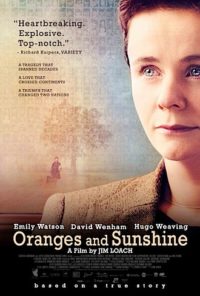 You can see a different, subtler, dare I say it better, version of Hugo Weaving in Oranges and Sunshine an emotional true story about a distressing twentieth century scandal. For decades until 1970, the British and Australian governments encouraged thousands of young children – many orphans but many not – to be deported from the UK to orphanages in the lucky country. For the governments it was explicit support for the ‘white Australia’ immigration programme and for some kids it meant unpaid forced labour (and worse) at the hands of the Christian Brothers.
You can see a different, subtler, dare I say it better, version of Hugo Weaving in Oranges and Sunshine an emotional true story about a distressing twentieth century scandal. For decades until 1970, the British and Australian governments encouraged thousands of young children – many orphans but many not – to be deported from the UK to orphanages in the lucky country. For the governments it was explicit support for the ‘white Australia’ immigration programme and for some kids it meant unpaid forced labour (and worse) at the hands of the Christian Brothers.
Emily Watson plays the crusading social worker who uncovered the tragedy nearly 25 years ago and who is still working to reunite people with their families today. It’s a shocking story told with (mostly) restraint.
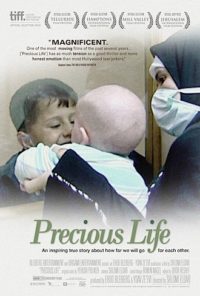 Also letting bitter irony do the heavy lifting is a documentary from Israel called Precious Life. TV Journalist Shlomi Eldar thought he was telling a human interest story about a baby from Gaza needing a life-saving bone marrow transplant at a Tel Aviv hospital but, as little Mohammad’s condition deteriorates along with the situation in the region, he finds that his film is taking on the concentrated power of metaphor: the saint-like doctor Raz Somech, desperately trying to make contact with his Gazan patients while – as an army reservist – he’s invading the same territory is the whole crazy shemozzle in a nutshell. Precious Life is easy to miss but I hope you don’t.
Also letting bitter irony do the heavy lifting is a documentary from Israel called Precious Life. TV Journalist Shlomi Eldar thought he was telling a human interest story about a baby from Gaza needing a life-saving bone marrow transplant at a Tel Aviv hospital but, as little Mohammad’s condition deteriorates along with the situation in the region, he finds that his film is taking on the concentrated power of metaphor: the saint-like doctor Raz Somech, desperately trying to make contact with his Gazan patients while – as an army reservist – he’s invading the same territory is the whole crazy shemozzle in a nutshell. Precious Life is easy to miss but I hope you don’t.
Printed in Wellington’s Capital Times on Wednesday 3 August, 2011.

